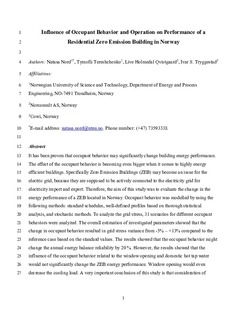Influence of occupant behavior and operation on performance of a residential Zero Emission Building in Norway
Journal article, Peer reviewed
Accepted version

Permanent lenke
http://hdl.handle.net/11250/2468334Utgivelsesdato
2018Metadata
Vis full innførselSamlinger
Sammendrag
It has been proven that occupant behavior may significantly change building energy performance. The effect of the occupant behavior is becoming even bigger when it comes to highly energy efficient buildings. Specifically Zero Emission Buildings (ZEB) may become an issue for the electric grid, because they are supposed to be actively connected to the electricity grid for electricity import and export. Therefore, the aim of this study was to evaluate the change in the energy performance of a ZEB located in Norway. Occupant behavior was modelled by using the following methods standard schedules, well-defined profiles based on thorough statistical analysis, and stochastic methods To analyze the grid stress, 31 scenarios for different occupant behaviors were analyzed. The overall estimation of investigated parameters showed that the change in occupant behavior resulted in grid stress variance from −5% to +13% compared to the reference case based on the standard values. The results showed that the occupant behavior might change the annual energy balance reliability by 20%. However, the results showed that the influence of the occupant behavior related to the window opening and domestic hot tap water would not significantly change the ZEB energy performance. Window opening would even decrease the cooling load. A very important conclusion of this study is that consideration of occupant behavior through challenging the standard values are highly necessary for reliable energy analysis of the ZEB solutions.
